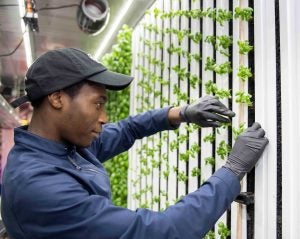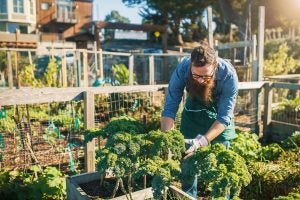With the farm labor shortage, it is more important than ever to attract those just starting to enter the workforce to the agricultural industry. Farming and agriculture are a booming industry, providing plenty of incentives for younger generations. Yet the industry still faces pushback from environmentalists. These misconceptions can deter the next generation — which strives for sustainability — from looking to farming as their potential career.
Many in Generation Z (typically marked as those born in the mid-1990s to the early 2010s) are old enough to go to college or begin careers, and farmers need to make agriculture look like an appealing choice.
As of the 2017 Census of Agriculture, the average age of the American farmer was 57.5 years old. That’s about 10 years older than in 1945. Farmers aren’t getting any younger, and as they near retirement age, a younger generation will have to take over.
While there are countless barriers to agriculture that exist — not the least of which are access to land and to capital — we can, and should, do what we can to prepare young people to execute the tasks of agriculture and to understand the labor and science involved. Leveraging training to attract the next generation of agriculture workers may be the solution modern farmers need. If you work in the farming industry, you already have a wealth of knowledge you can share that will excite Gen Z and foster a younger community of farmers.
Developing and offering a training program that will attract Gen Z employees may help secure the future of agriculture.
Offer temporary positions
Gen Zers often look for long-term career options. Agriculture can offer that. As Gen Z enters the workforce, they can experiment with various jobs within the agricultural industry. Actively creating opportunities for short-term jobs and seasonal work will train the upcoming generation on farmers’ many duties, therefore expanding their education on agriculture.
Whether you need them for a few days to pick crops or a few months to help with a maintenance project, they can try various responsibilities. This could be just the start of a vigorous training program that would lead to dedication in the farming sector.

Showcase technology on the farm
Technology is becoming increasingly necessary for farms to meet the growing demands of increasing populations. Gen Zers grew up in a world dominated by screens and technology. Not using tech in a training program could turn the younger generation away.
The use of technology in a training program can make it easier for the next generation of agricultural workers to grasp farming techniques and practices. Young people are more excited about technology, on average, than previous generations. Seeing it in action in a thriving agricultural setting will help them engage with and get excited about the field.
Just a few of these technologies include automated robots, Internet of Things (IoT) sensors, and GPS-powered precision agricultural platforms. Depending on the budget involved, technologies can become a part of the training process, too, such as through augmented (AR) and virtual reality (VR).
Generation Z is already used to working with technology, but they do their best work under certain circumstances. When they’re given a chance to “get their hands dirty,” so to speak, and see previously abstract ideas or hypothetical technologies deployed in the real world, their imagination and engagement get sparked immediately.
Moreover, while everybody learns a little bit differently, kinesthetic learning — learning through hands-on experience — is seen as one of the most effective ways to internalize new information quickly. Training using technology is a modern, engaging and exciting experience — and using it for both onboarding and for daily tasks helps cut through the false messaging that farming is stuck in the past.
Teach about sustainability
Sustainability in agriculture and other industries is a popular topic within the agricultural sector. Gen Zers love the environment and may fear that the farming industry doesn’t follow sustainable or environmentally friendly practices because of perceptions of pesticide usage and the portrayal of over-tilled and eroded agricultural fields in the media. This is your chance to educate them about your policies and how they benefit the environment.
Gen Zers entering the workforce want environmentally sustainable options. Thanks to media misconceptions, agriculture can be looked down upon as an unsustainable business.
However, the farming industry is increasingly incorporating sustainable farming practices. It’s important to remember to teach Gen Zers what you do on your farm so that they get the best education and training possible, and so that they understand how they are caring for the environment in their work.
Providing them with the skills they need to succeed as sustainability becomes a priority will ensure they see a future career in agriculture. By appealing to their environmentally conscious sensibilities, you end up with a steady supply of next-generation farmers.

Provide urban agriculture experiences
Many urban agriculture training programs are already available to the next generation of farmers. Urban farming has recently become popular, especially with the outbreak of COVID-19. People living in cities want a way to get fresh produce without leaving their homes. Many decided to grow their own indoor crops, while others began to rely on urban farming for fresh fruits and vegetables.
Even without pandemic-related issues, the food system is in dire need of a way to attract younger generations. For example, one training program that has proven successful is the Next-Gen Farmer Training Program offered by Square Roots, which aims its training at newer farmers or those who still haven’t decided on a career path yet.
Universities across America offer urban agriculture training and programs as well. The Farm School NYC provides two years-worth of urban agriculture training. Experts in farming, like you, teach about various topics within sustainable agriculture.
Another program to gain inspiration from is the Organic Farm School, which teaches the basics of organic farms. It focuses on teaching people what it takes to manage a small-scale farm, which are what most urban agriculture centers are.
Offer transparency for next-gen farmers
What Gen Z really wants is transparency. They want to know where their food comes from and how it got from the farm to their plates. Building strong continuing education programs offer a chance for young people to better understand the world’s food critical supply chains and use technology to put their own mark on this booming industry.
Of course, there are other barriers to entry in agriculture — such as securing land and financial resources. Training is a small piece of a much larger puzzle. But training is also essential to cultivating buy-in, interest, and passion in today’s workers. Hands-on training is typically how people learn and retain information best, and it’s what will help keep farmhands excited about the industry and invested in its future.
Rose Morrison is a freelance writer as well as the managing editor of Renovated. Check out her Twitter to see more of her writing


